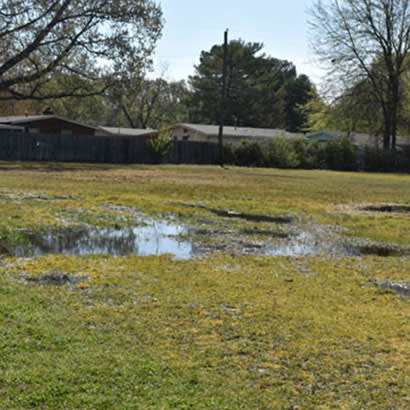
“A kite-flying field. Big, shady trees for picnics. Somewhere to play with friends. A spot to watch birds and butterflies. Something for my mom to do. Better football practice space.”
During spring break of 2019, 84 youth, ages 4 to 15, deliberated over park amenities in a “Design Your Park” workshop at the McFarland Community Center. The purpose was to engage young residents in brainstorming how they would like to use a nearby park space and what types of play spaces and features would best meet the community’s needs. This workshop was part of a larger park redevelopment project the city of Memphis is embarking on through the National Recreation and Park Association’s Great Urban Parks Campaign (GUPC). As a GUPC project grantee, the City of Memphis Division of Parks and Neighborhoods is transforming an 11-acre green space known as McFarland Park into a needed and desired opportunity for neighborhood gathering space and physical activity.
Although the current amenities at McFarland Park are varied, the space remains extremely underutilized due to consistent park flooding. This is especially concerning because McFarland is the only green space serving the immediate neighborhood. Central to park improvements for McFarland Park is green stormwater infrastructure (GSI) in the form of a bioswale. This bioswale will alleviate flooding by controlling the route and slowing the pace of stormwater runoff. The installation of this bioswale removes a significant barrier for park utilization and helps ensure that children and families can actually use the green space. Now that this barrier has been removed, we can think creatively about how McFarland Park can best serve its community.

To learn more about the community’s desires for the park, we held a community festival at McFarland Park, co-hosted by our new partner, the City of Memphis Storm Water Department. This event allowed community members to learn hands-on about stormwater infrastructure, but also presented initial park plans and solicited feedback from future park users. We also held a “Design Your Park” workshop with youth during spring break camp at the community center adjacent to the park.
Our team found that these informal methods of community engagement were more successful than traditional community meetings. Interactions are more conversational, and neighbors asked more questions when they had a one-on-one opportunity. We were able to reach some individuals that were unlikely to attend formal meetings, such as single parents, second shift employees and youth of all ages. One mother of three expressed her surprise at learning how large the green space truly is. Her children all attend the adjacent Evans Elementary School, and her family frequents events at the community center, but they have never truly used the green space. She looks forward to having family picnics with her children at the park following renovations. As our parks division approaches a special season of community engagement with our parks master plan, we will be incorporating our experience from McFarland Park by providing informal opportunities for public engagement and being intentional about involving special populations.
McFarland Park is the first GSI-specific development in our park system. This project would not have been possible without leverage provided by funding, resources and encouragement for GSI development by the Great Urban Parks Campaign. Our team is hopeful that this initial GSI project will lead to more GSI development in our park system, as well as in our region. McFarland Park will serve as an example to our park colleagues, our local funders and Memphians to see how GSI can benefit our communities. We look forward to the implementation of our project in 2020!
Amy Collier is the Grants Admin Specialist for the City of Memphis Division of Parks and Neighborhoods.


